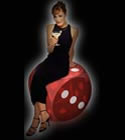Seventh Street
On seventh street, the situation frequently becomes scary.
This is because everyone gets a downcard, and if you happened to have the best hand on sixth street, your opponents likely are drawing to beat you. (The last card generally has more impact in stud eight-or-better than in any other form of poker regularly spread in public cardrooms.)
However, you usually need to bet anyway and see what happens. The exception to betting is if you have a made low hand and are up against a high hand and one or more opponents who were drawing to a better low.
If you bet, the high hand will raise, and the other low hands either will fold or will reraise if they have improved to what they were hoping for.
But if your have the best low hand and are against other players with made low hands who are likely to pay off whether they have improved or not, then you of course should bet or raise (into them).
It is worth taking this you have a high hand, there are low hands against you, and a split pot is certain (as long as one of the low hands hasn’t improved to a straight, a flush, or something better, and it is likely that one or more of these draws is out), you should just check and call.
In this case, you are hoping to split the pot, and if there is a bet and a call, you might even make money on seventh street.
However, you should lead on the end with your high hand if there are two or three players in the pot who look as though they will call with weaker high hands.
Most players will check, because they are afraid of running into a low hand that has turned into a straight or a flush. But there is frequently value in betting.
Here is another situation that comes up on seventh street. You miss a low draw but make a pair, perhaps even a small pair.
A player who has been betting most of the way bets again, and it appears that he has a low hand.
Sometimes if he is bluffing, and if your pair beats a pair that he could have made on an earlier street, you may have the “Hoggar.”
If he does have the low, your (small) pair may enable you to split the pot. Thus, you must keep in mind that if your low hand has busted out but have a small pair, it is still may be worth half the pot or perhaps even the whole pot.
If there is plenty of money in the center, it is often worth a call and sometimes worth a raise when the low hand bets and you have missed.
Your raise might even knock out the high hand who has only one big pair. Even though the opportunity for this play may come up a couple of times a nigh, you can’t make it all the time.
However, it is worth considering against the right opponent. Suppose in a two-person pot that you have an obvious high hand, such as a pair of kings.
On an earlier street, your opponent made three low cards on board, and you both checked. You now suspect that his most likely hand is four low cards with a pair.
Further suppose that on the river, you make kings sup. Should you bet ? Even though most players will check and call, because they are afraid that they might run into a straight, this is wrong.
What normally happens is that if your opponent makes two pair, he will pay off your bet and you get to hog the whole pot.
You will lose only if he does make the straight or if he makes three of a kind. So frequently, betting is the answer.
Even though there is much risk, this bet shows a profit in the long run. In another case, suppose you have a big pair in the hole, and it looks as though you are against someone who also has a big pair.
He has been calling you down, but his pair does not appear to be as large as yours, and you have some small cards up.
If your opponent checks to you on the river, you want to bet your one pair against him, because he will call hoping to split the pot against a low hand.
Introduction / General Strategy / How Far Do You Go? / Fourth Street / Check-Raising on Fourth and Fifth Streets / Fifth Street / Sixth Street / Seventh Street / Afterthought


